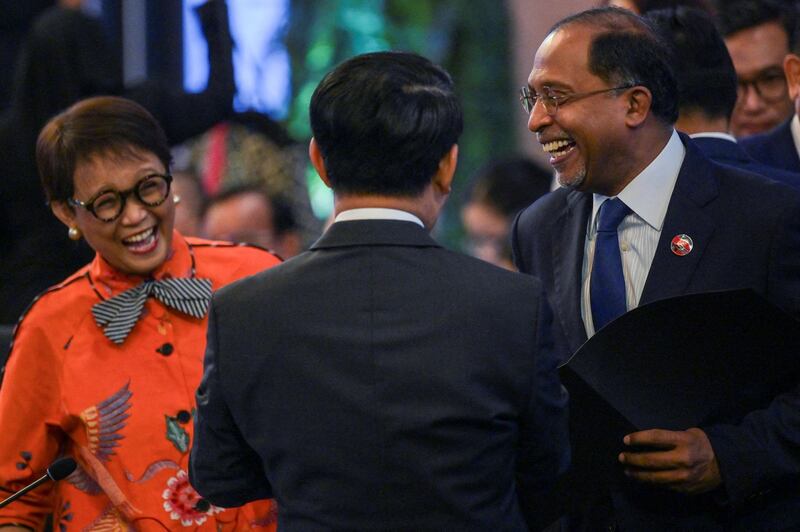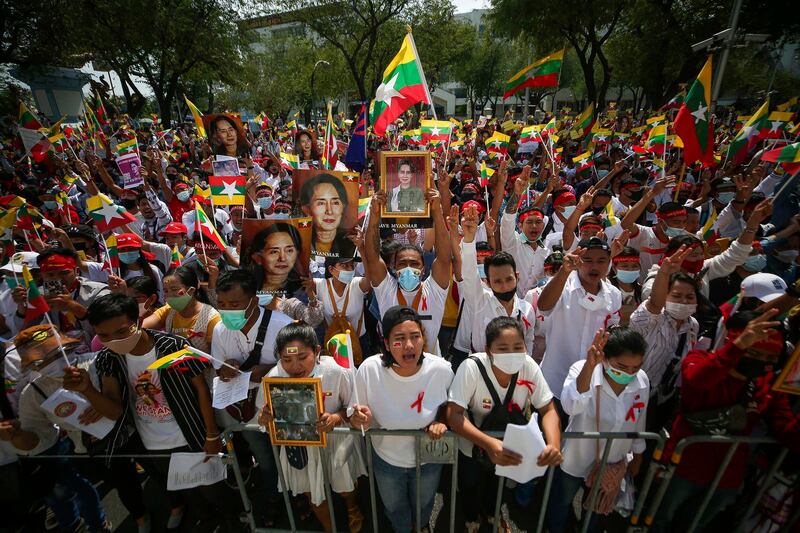Earlier this year, ASEAN (the Association of Southeast Asian Nations) did something sensible. With Laos assuming the bloc’s annual rotating chairmanship for 2024, certain Southeast Asian officials became a little jittery at the thought of the region’s least diplomatically experienced and most hermetic government handling the group’s response to the crisis in Myanmar, a member of ASEAN.
At the ASEAN Summit in Jakarta in September, it was decided that a troika of states would assume responsibility for managing the crisis. Under this system, responsibility for ASEAN's response will be shared by the foreign ministers of Indonesia (the 2023 chairman), Laos (the 2024 chairman) and Malaysia (the 2025 chairman).
This decision appeared to offer a reprieve to Vientiane, which didn't want to have to intervene in the crisis, and as a way for states like Singapore, Indonesia and Malaysia—wary of Vientiane's intentions and whether its benefactors in Beijing are trying to use Laos as a conduit to alter ASEAN's policy on Myanmar—to prevent Laos from going rogue on the issue.

Indeed, Laos was one of the only Southeast Asian countries to participate in Thailand’s “Track 1.5” dialogues with Myanmar’s junta leaders, which were seen as massively undercutting ASEAN's unified response.
The purpose of the troika system for the crisis in Myanmar following the February 2021 military coup was spelt out by the Indonesian Foreign Minister Retno Marsudi. It provides "sustainability" in handling the crisis "because everyone understands that the situation cannot change in one year," she stated.
Because of this, the troika is likely to be extended, so the Philippines—the chair for 2026, after Myanmar’s tenure was canned—will likely join in 2025 as Indonesia drops out.
It isn’t a new idea. ASEAN did something similar in 1997 when a “coup” by Cambodia’s co-prime minister Hun Sen against his power-sharing partner jeopardized the country’s planned ascension into ASEAN. It didn’t feature the past-present-future format, but three states (the Philippines, Indonesia and Thailand) cooperated and Cambodia became a member in 1999.
The following year, ASEAN adopted a troika " terms of reference", a blueprint, if you will. A troika mechanism to resolve the Myanmar crisis was also suggested in 2021 and 2022 but didn't gain traction until this year, obviously because of concerns over Laos' chairmanship in 2024.
Troika-chairmanship system
But what about extending the troika system more broadly? As things stand, each year the chairmanship of the bloc is passed in alphabetical order among members: Indonesia has it this year, Laos for 2024 and Malaysia for 2025.
But consider a troika-chairmanship system. Every year, three states would share the responsibilities. This can continue on the basis of the alphabetical order and with the past-present-future format. So, for 2024, the chairmanship would be shared by Indonesia, Laos and Malaysia. For 2025, it would be Laos, Malaysia and the Philippines (now that Myanmar has been excluded).
For 2026 it would be Malaysia, the Philippines and Singapore. Under this system, each country would be part of the troika for two years, thereby ensuring more continuity across the years and giving each state another 12 months to hone its diplomatic skills. Similar to the troika system for the Myanmar crisis, as Marsudi spelt out, it would also ensure sustainability in ASEAN policies.
Most importantly, it would bring some well-needed unity and compromise to ASEAN proceedings, given the increasing schisms now forming. If ASEAN is genuine about neutrality amid the U.S.-China Cold War, does it make sense for a Chinese ally (Laos) or an American ally (the Philippines) to hold the ASEAN chairmanship for a year?
According to ASEAN’s own troika “terms of references”, the mechanism “would serve to elevate ASEAN cooperation to a higher plane and further serve to enhance ASEAN's unity and solidarity, as well as its overall effectiveness.” If that’s the goal, why only apply it selectively and rarely?

Indeed, in defending the troika system for the Myanmar crisis, Marsudi put it: “everyone understands that the situation cannot change in one year.” But the same holds true for many of the other problems ASEAN faces, including the South China Sea disputes, how the bloc engages in the US-China Cold War, and economic integration. No doubt outside powers would find ASEAN a far easier partner to work with if there was greater continuity between one year and the next.
"Since ASEAN initiatives remain informal and non-binding, leadership was not seen as a necessary option. However, given the current geopolitical circumstances, a need for a formidable level of leadership may be crucial," Joshua Bernard B. Espeña and Don McLain Gill argued in 2020. And sources tell me that the role of chairman has become "more authoritative in recent years".
At the moment, however, the chairman essentially has the prerogative to decide whether they'll lead unilaterally or consensually. In early 2022, Hun Sen, then prime minister of Cambodia, the chair for that year, decided not to consult with his ASEAN partners before flying off to Naypyidaw for an embarrassing talk with the junta leaders. And he did so ostensibly on ASEAN's behalf, which didn't go down too well in Jakarta and Kuala Lumpur.
Pressure on weak states
Similarly, Cambodia, an "ironclad" friend of Beijing, was perceived as taking China's side in the South China Sea disputes when it was chairman in 2012, which led to the bloc failing to deliver a post-summit communique for the first time. There are similar jitters about whether Laos sides with Beijing against its Southeast Asian neighbors next year.
Moreover, the single chairmanship puts a lot of undue pressure on the occupant. I’m told that Cambodia, as chair in 2022, was so eager to push the South China Sea issue off the agenda this time around that it searched around for any distraction, which perhaps explains why so much progress was made on Timor-Leste’s ascension into the bloc.
Of course, the troika system would partially remove what makes the annually rotating chairmanship appealing, especially for the region’s smaller countries. Because every country gets to host the ASEAN and East Asia Summits, there’s a certain frisson when world leaders come to town, such as when Barack Obama flew into Vientiane for the Laos-hosted ASEAN Summit in 2016, becoming the first sitting U.S. president to visit in almost half a century.
The current system allows the smaller states to advertise their local economy, especially tourism. (Laos is running its “Visit Laos Year 2024” campaign next year to coincide with its chairmanship.) It also helps the occupying chairman to advance their geopolitical ambitions.

It cannot be overstated how important Cambodia’s chairmanship in 2022 was to Phnom Penh improving its relations with the West, which had drastically declined. Hun Sen, who was considered something of a Chinese client by the West, got to host Joe Biden, the U.S. president, and the European leaders in Phnom Penh and co-chaired ASEAN events in Washington and Brussels.
However, the responsibility of hosting the ASEAN events can also be onerous. Although Laos’ communist government is putting on a brave face, some officials in Vientiane tell me they aren’t looking forward to the burdens and costs of putting on hundreds of events next year, especially as the country is engulfed in an economic crisis, with one of the highest inflation rates in Asia and a collapsing currency.
Most of these problems would be solved through a troika-chairman system. With three chairs, it would prevent one from going rogue and conducting its own private diplomacy ostensibly on behalf of ASEAN. Responsibility for hosting and paying for the ASEAN events could be shared, which would ease the burden on national governments, especially the poorer ones. And it would allow ASEAN a better chance of showing much-needed proactive collective leadership, not just the bloc’s traditional reactive consensus decision-making.
ASEAN wasn’t formed as a bloc in which its members would pool their sovereignty, unlike the EU. But that doesn’t mean that each member needs to act only out of self-interest. There is now much talk about the lack of unity. Small wonder when the block is structured as it is.
David Hutt is a research fellow at the Central European Institute of Asian Studies (CEIAS), the Southeast Asia Columnist at the Diplomat, and writes analysis pieces for several newspapers and magazines. He has covered Southeast Asian politics since 2014.
